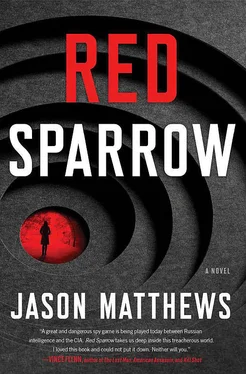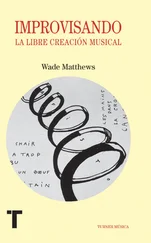There were two points of vulnerability: Golov as rezident of course could be followed constantly, monitored electronically, beaconed, bugged, and buttoned. But he was too good, too cautious to lead surveillance to a meeting. He moreover had a dedicated Zeta Team of countersurveillants who followed their chief as a hostile surveillance team would, at the same distances and using the same techniques, both to detect and impede opposition coverage on the rezident . SWAN herself posed the larger problem. She could go crashing around Washington without a thought of staying anonymous and accidentally be seen with Golov, or bring attention to herself unnecessarily. No tradecraft could control that.
But if someone noticed a leak, or if there was a tip, then the American mole-catchers would indeed come out of their holes and never stop searching. And where would such a leak originate? For one, from the son-of-a-bitch SVR traitor who was being handled by Nathaniel Nash, American CIA officer, that’s who. Egorov slammed his fist down on his desk. Someone in this building. Someone he likely knew.
There were a half dozen high-level officers outside the restricted list who had indirect knowledge of SWAN and who supported the case. Vanya mentally listed them now: the owlish Yury Nasarenko, director of Line T (Science and Technology), and the chiefs of Lines R (Operational Planning and Analysis), OT (Tech Support), and I (Computer Service). These officers knew they were supporting an exceptional case, they could infer where it was being run. They did not know the identity of SWAN, but they had access to the raw reports, and much could be gleaned. Despite their ranks and positions, they would all have to be vetted, and for that distasteful task Vanya had the dwarf, Alexei Zyuganov, director of Special Service II, Counterintelligence, Line KR.
Egorov knew the prospect of an internal investigation against his own professional colleagues would bring Zyuganov as close to a state of upoenie, sheer ecstasy, as was possible in this life, possibly with the exception of his work in the basement of the Lubyanka. Vanya had given the dwarf full authority for his internal investigation and the little man with the big ears and the bland grin went away happy, his mind brimming.
Egorov looked out the window of his executive suite. Who else could jeopardize SWAN? The Director, of course. Probably a half dozen or more in the Executive Secretariat, the President’s Office, the Office of the Minister of Defense. But there was little Egorov could do about people out of his reach. Who else? The only other senior officer worth considering was Vladimir Korchnoi, director of the First Department (America and Canada), who, although he was not cleared for SWAN, was finely attuned to what was happening operationally on his turf. They were good friends, addressed each other with affectionate, village diminutives. Volodya Korchnoi was of the old school. He was trusted and liked by officers in the Service. He also had connections throughout the Service, allowing him to hear a lot of gossip. And he was currently directing the operation to get to Nash.
Egorov thought how seldom he saw or spoke to Korchnoi these days. His friend was getting old. Several more years until retirement, perhaps. By that time Egorov would be at the top of the heap, he could choose a loyal protégé to take over the Americas Department then. Even though Vanya knew in his heart that it was unlikely—impossible—that treason resided in the First Department, he decided to add Korchnoi to the list for art’s sake. He would attend to the Service first, then attend to the American Nash. Za dvumya zaitsami pogonish’sya ne odnogo ne poimaesh, he thought. If you chase two rabbits, you will not catch either one.
=====
Chief of Directorate T Yury Nasarenko waited at the threshold of Egorov’s office like a serf waiting to be invited into a barn. Tall and gangly, even at the age of fifty, Nasarenko wore thick wire glasses that were bent and pitted with years of absentminded misuse. He had a big head, a jutting forehead, wing-flap ears, and exceptionally bad teeth, even for a Russian. He was a nervous man who twitched, and jerked his head, and bent his thumbs, and touched his sleeves in a constant marionette show of movement. He had a large mole on the left point of his chin, which Egorov used as an aiming point when speaking to Nasarenko to avoid looking at the quivering entirety of the man. Despite his outward habits, Nasarenko was a brilliant technical mind, someone who understood the science of a problem and could also apply theory to operational need or intelligence production.
“Yury, come in. Thank you for coming so promptly,” said Egorov, as if Nasarenko had had a choice of appointment times and dates. “Please sit down. Have a cigarette?” Nasarenko sat down, shrugged his shoulders, clasped his hands in his lap, and bent his thumbs twice very fast.
“No, thank you, Ivan Dimitrevich,” said Nasarenko. His eyebrows lifted and fell and Egorov fixed his gaze on his chin.
“Yury, I want to tell you that you are doing an exceptional job with the information that is coming in about the Americans’ space vehicle. The Service is being complimented at the highest levels on the work so far,” said Egorov.
More precisely, he was receiving compliments for the SWAN case so far.
“That is good to hear, Ivan Dimitrevich,” said Nasarenko. “The information is exceptional. My analysts and I are quite impressed with the brilliance of the concept.” Nasarenko looked across the desk at Egorov’s impassive wrestler’s face. “Of course, Russian space technology is easily the equal of this project,” he added with a double bob of his Adam’s apple, “but the Americans’ work is remarkable.”
“I agree,” said Egorov, lighting a cigarette. “I wanted to tell you to continue working on your analyses and assessments, but also wanted to notify you that the intelligence stream will temporarily be interrupted. The source of the information, a sensitive source that I cannot describe further for obvious reasons, is wrestling with health matters and must suspend work for a short time.” Egorov let the sentence hang in the air.
“Nothing so serious as to curtail the information, I hope?” asked Nasarenko, leaning forward in his chair. His right leg and knee vibrated slightly.
“I sincerely hope not,” said Egorov expansively. “An attack of shingles can be debilitating. I am hoping our source will recover soon.”
“Yes, of course,” said Nasarenko, “we will continue our analysis of the existing information. There’s more than enough data to keep us busy for some time.”
“Excellent,” said Egorov. “I know I can rely on you to keep working.” He rose and walked Nasarenko to the door, his hand on the other’s jittery shoulder. “Acquiring this information is important, Yury, but how we exploit it is critical. That’s where you come in.” Egorov shook hands with the man and watched him walk away down the corridor toward the elevators. His head to one side, walking with a starboard list, Nasarenko looked like a Petrushka puppet in a Skomorokh show with a cut string. “If such a man is a spy,” Egorov whispered to himself, “we are doomed.” He turned back into his office.
=====
Line R Chief Boris Alushevsky was no Yury Nasarenko. He tapped once on the frame of Egorov’s door and walked calmly across the room, a smooth gait with no affectation. Forty years old, he seemed older and looked thoughtfully dangerous. He was thin, dark, his sunken cheeks and prominent cheekbones were clean-shaven but swarthy. He had black almond-shaped eyes, a strong jaw, and a large nose. The dense thatch of jet-black hair piled on top of his head was wavy and thick and shiny, making Alushevsky look like a Kyrgyz Central Committee member from Bishkek. He was actually from Saint Petersburg.
Читать дальше












